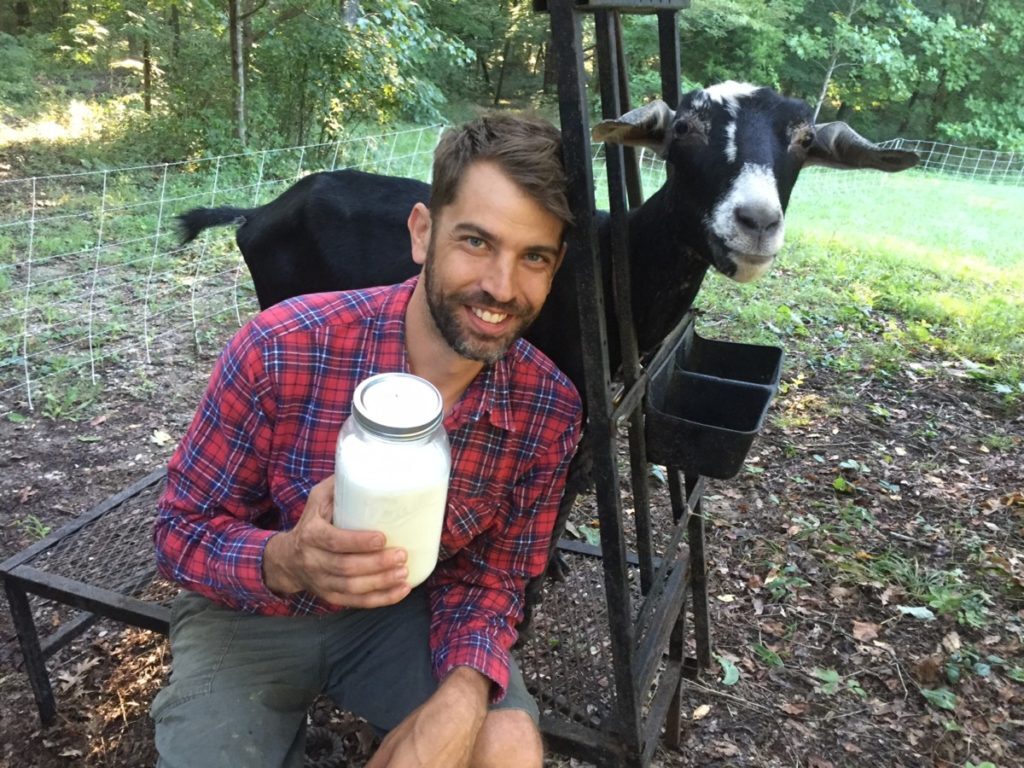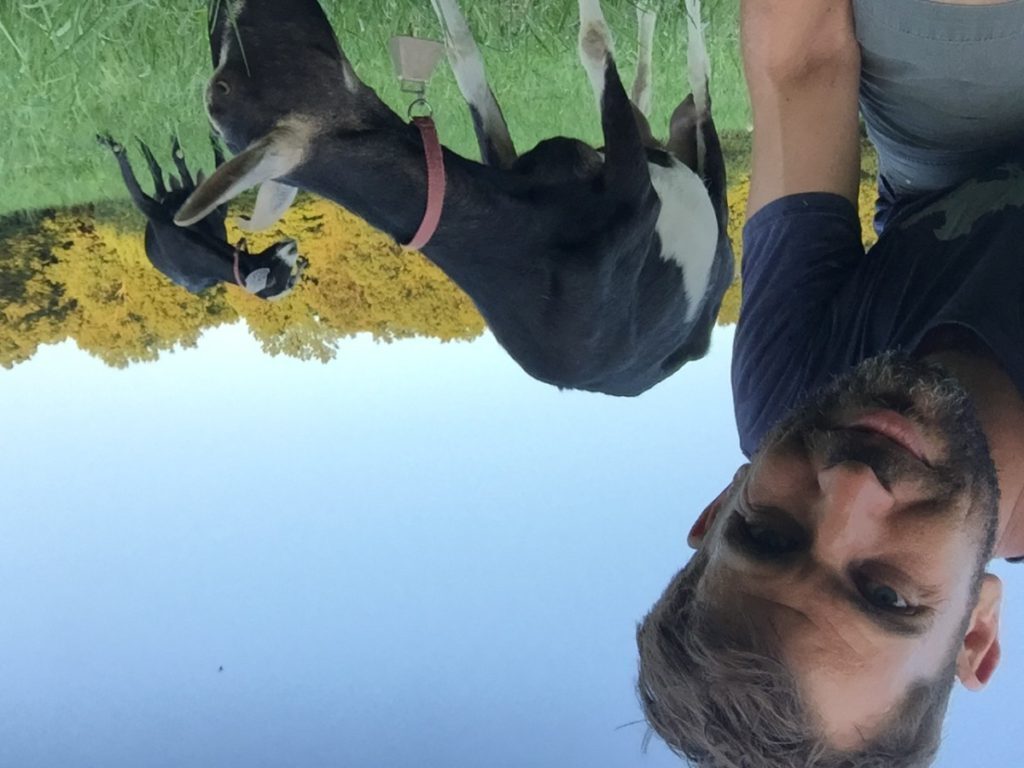
Dr. Drew Ramsey broke onto the healthcare and wellness scene with with his first book The Happiness Diet, and then solidified his place as an expert with his second book, 50 Shades of Kale. The psychiatrist is a leading proponent of using dietary change to help balance moods, sharpen brain function and improve mental health. During his “day job,” Dr. Drew is an assistant clinical professor of psychiatry at Columbia University College of Physicians and Surgeons and in active clinical practice in New York City where his work focuses on the clinical treatment of depression and anxiety. Using the latest brain science and nutritional research, modern treatments and an array of delicious food he aims to help people live to their happiest, healthiest lives—and he’s one of our W.E.L.L. Summit keynote speakers on Friday evening! To give you a glimpse into his work and what he hopes to share at the W.E.L.L. Summit, we chatted with Dr. Drew about everything from milking goats to why the American diet may be responsible for a global health crisis. Read on for the inside scoop!
How would you introduce yourself to the W.E.L.L. Summit tribe?
I’m an Indiana farm boy turned NYC psychiatrist. But most importantly, I’m a husband and father.
My main professional identity is a physician and I’m ultimately here to serve. My life revolves around the brain and mental health, and I want to help us get into a conversation about mental wellness and how our everyday decisions impact brain health and happiness.
I grew up in poor, rural Indiana on a small farm with my parents. They were part of the homesteaders movement in the 1970s, and we moved to Indiana to connect with nature, each other and to foster self-sufficiency. I’m weaving all of that into my psychiatry background (where I’ve been practicing for 15 years), and hoping to change how we think about mental health and food. I’m coming from the perspective of your brain, taking the latest science on the brain and using it to guide us to a different set of food. I’m cutting through the diet fads and the controversy around food to narrow down what we should eat for optimal brain health and happiness.
How would you describe the connection between food and mental health?
Food is fundamental to mental health. The structure of your brain is literally determined by what you eat. Making a set of choices about food is the same as making a set of choices about mental wellness.
It’s partially about helping people move away from the damaging messages of fear around food, and replacing that with a state of fun and joy with food. I want to fill your plate with the rainbow, literally, with more colorful plants, for better brain health. But we also need to discuss the importance of controversial foods like meat and seafood—they have a place in our overall diet.
Brain health is about personalized nutrition; my job is to serve you where your diet is at in a non-judgmental way, and to tailor your food plan to YOU. I always tell people that there’s only one food plan on the planet, and it’s YOUR food plan. That’s the most fulfilling part of my career, working with individuals to see how we can positively impact their mental health by adjusting their food plan to fit them best.
Now, we can get into lots of “battles” about food choices, vegan vs. paleo, and the like, but my concern is more with how, as a country, we’re still eating excessive amounts of cheap meat and processed foods that are causing damage to our selves, our society and our planet.
I feel certain that the healthcare crisis our country is facing has been caused by diet—and the average American diet is responsible for our global epidemic of depression, heart disease and obesity. Food is the root cause because our healthcare system never asks about food or diet when patients come in. Our healthcare system and its practitioners don’t see how it has a role in embracing dietary changes to sustain health. I’m trying to change that.
I work with physicians around the country to incorporate food into their treatment plans, and between teaching brain nutrition at the annual American Psychiatric Association’s meeting for the last four years and my work with groups of physicians, I feel that we’re seeing a sea change. Ten years ago, my position was seen as risky, and I thought pushing nutrition might get me fired from my teaching position at Columbia University. But what we’re scared of is often the door we must walk through, and Columbia, as well as the APA, have embraced my work and helped to further the message.
I used to think of my background as a farm boy as separate from my work as a psychiatrist, but I was wrong. When those worlds come together, I find joy and contentment and gratitude. Who knew a kale plant could have so much power?
 Dr. Drew with one of the 4H Champion lactating goats he, his wife and his two kids leased in summer 2016. “We spent weeks understanding dairy through taking care of our goats, milking them every morning,” he says. “It made me appreciate the simple brilliance of communing with animals, and it was really profound, going from the science of grassfed animals to the reality of spending time with goats—with a five-year-old and a three-year-old too!”
Dr. Drew with one of the 4H Champion lactating goats he, his wife and his two kids leased in summer 2016. “We spent weeks understanding dairy through taking care of our goats, milking them every morning,” he says. “It made me appreciate the simple brilliance of communing with animals, and it was really profound, going from the science of grassfed animals to the reality of spending time with goats—with a five-year-old and a three-year-old too!”
What can the W.E.L.L. Summit tribe do today to promote a healthy, happy brain?
The first step to finding contentment with food is to increase mindfulness. Sit in front of your meal for a few minutes and find curiosity and gratitude about it. Be present with the flavors and smells; ask, where did this come from? That gratitude, not a mindless, rushed consumption can create a foundation for health and wellness. On-the-go food = an out of balance life. Instead, try to be in deliberate, mindful communion with your meals.
Tell us about your new book, Eat Complete: The 21 Nutrients That Fuel Brainpower, Boost Weight, and Transform Your Health.
It’s my third book and I consider it the capstone of my work over the last decade. It’s meant to translate scientific research about mental health info a core set of food and recipes, and it’s about transforming your health through food by feeding your brain first. Your brain consumes more than any other part of your body, so that leads us to a different set of foods and food guidelines to support it.
There’s a self-assessment in the book to help each person understand the particular challenges they face related to food, and then I recommend delicious, colorful, sustainable solutions. The recipes start with core foods, and a simple way of cooking and eating. I understand the need for efficiency and economy—I’m a simple cook myself, and I want the authentic flavors of the fresh food to come through.
My personal journey of nutrition is that I was a low-fat vegetarian or vegan for 15 years, but now I eat beef and seafood. I still don’t eat chicken and I’ll only eat goat’s cheese, not goat meat, but I add in meat, seafood and other foods because I know the significance they have for brain and mental health. My hope isn’t that people eat like I eat, but that they find foods that represent a combination of common sense and cutting-edge science, and can then feel confident in what they eat.
What can we expect from your keynote at the W.E.L.L. Summit?
Kale cocktails. Hahah!
I want to share a global perspective on how your fork is a tool for worldwide happiness. You as an eater play a tremendous role in spreading respect and thoughtfulness around the challenge of finding space and contentment when it comes to food and mental health, and we’ll talk about that in my keynote.
I’ll also bring concrete tips about the science of eating food for brain health, so attendees can implement my strategies right away. I want you to be inspired to find joy in your food, and to be able to ask the right questions about food for your future.
One last thing… you’re the co-founder of National Kale Day, happening on October 5. Tell us more, as we’ll definitely be celebrating with you!
What started as a simple idea to translate knowledge from 50 Shades of Kale has kind of grown into a national movement! On October 5, millions of students across the country, as well as military commissaries (thanks to the Department of Defense) across the world, will be served kale as part of their daily lunch. It’s a testament to the power of veggies—if you focus in and find creativity and joy in food, you can change the world. Kale eaters, you did that!
I’ve been around to see the explosion of kale and the backlash to it, and I think it speaks to the pathological way we think of food and fads. It’s dangerous and unhealthy. I want to help change that. And I’ll be eating kale forever because I enjoy it and, most importantly, I feel better when I eat it regularly.
Join in on the National Kale Day festivities on October 5 and then make sure to mark your W.E.L.L. Summit calendar for Dr. Drew’s keynote session on Friday evening. Yay kale!